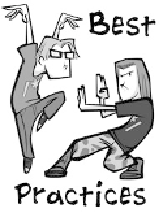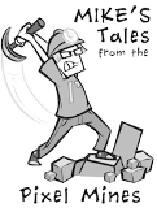Game Development Reference
In-Depth Information
as innocuous as a few extra names in the credits, or it could be a completely new
terrain system. You think I
'
m kidding, don
'
t you?
Whether it is code, art, sounds, models, map levels, weapons, or whatever makes
your game fun, you
'
ve got to be serious about finishing your game. You can
'
t finish
it if you keep screwing with it! If you are really lucky, you
ll wind up at a company
like Valve or Blizzard, who can pretty much release games when they
'
re damn good
and ready. The rest of us have to ship games when we get hungry, and the desire to
make the best game can actually supersede basic survival. At some point, no matter
how much you tweak it, your game is what it is, and even superhuman effort will
only achieve a tiny amount of quality improvement. If you
'
'
ve ever heard of some-
thing called the
“
theory of diminishing returns,
”
you know what I
'
m talking about.
'
When this happens, you
ve already gone too far. Pack your game up, ship it, and
hope it sells well enough for you to get a second try.
The problem most people have is recognizing when this happens
—
it
'
s brutally diffi-
cult. If you
re like me, you get pretty passionate about games, and sometimes you get
so close to a project that you can
'
'
t tell when it
'
s time to call it done and schedule the
Ship Party.
Find Your Own Beta Testers
Microsoft employs late stage beta testers. These people work in other parts of
Microsoft but play their
latest games. Beta testers are different
from
playtesters because they don
t play the game every day. They are always just
distant enough and dispassionate enough to make a good judgment about
when the game is fun or when it
'
t have Microsoft footing
your development bills, find ad hoc testers from just about anywhere. Ask
your friends or family. You don
'
s not. If you don
'
t need professional testing feedback. You just
need to know if people would be willing to plunk down some money for your
game and spread the word about how good it is.
'
A Bug Becomes a Feature
When I worked on the Ultima series, it wasn
t uncommon for truly interesting
things to be possible, code-wise, at a very late stage of development. On
Ultima VIII, a particular magic spell had a bug that caused a huge wall of
fire that destroyed everything in its path. It was so cool we decided to leave
it in the game and replace one of the lamer spells. It wasn
'
t exactly a low-risk
move, completely replacing a known spell with a bug-turned-feature, but it
was an awesome effect, and we all felt the game was better for it.
'






